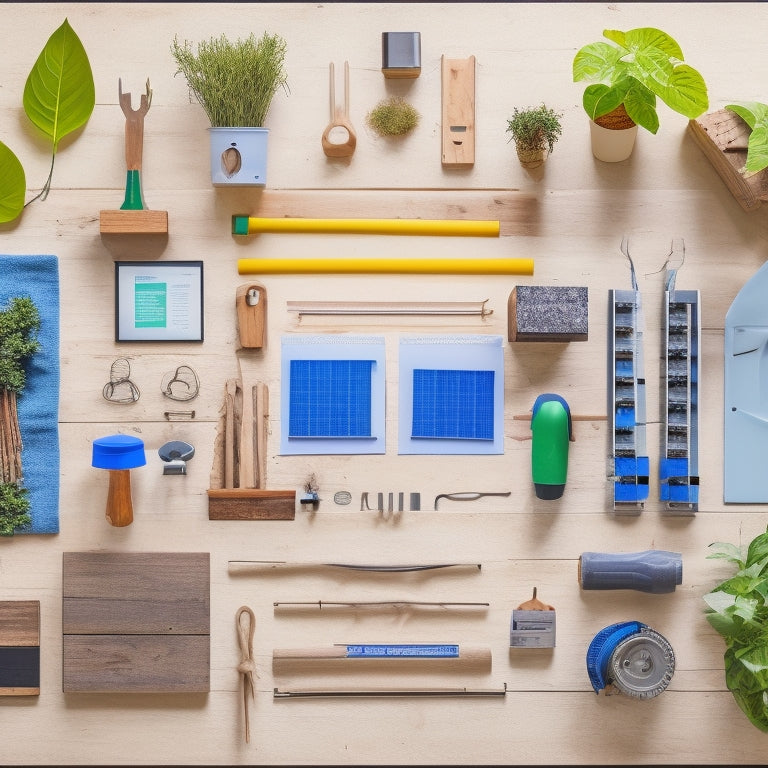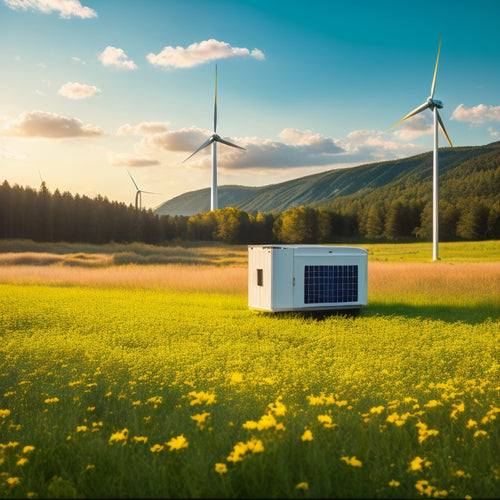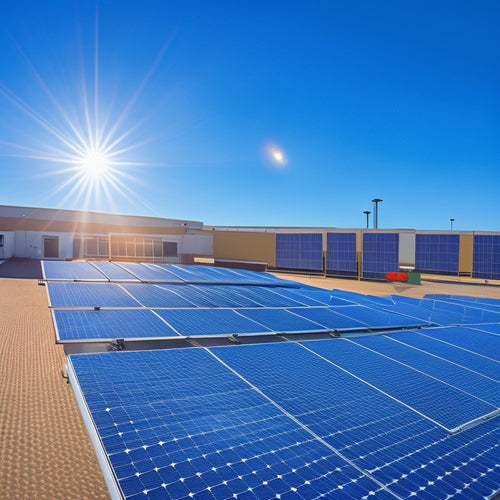
Top 10 DIY Renewable Energy Kits Compared
Share
You're looking to invest in a DIY renewable energy kit to reduce your carbon footprint and save on energy bills. You've got multiple options to evaluate, including solar panel kits that provide control over energy production, wind turbine kits that benefit from durable components, micro hydro power kits that generate power with minimal water flow, and geothermal energy kits that harness the Earth's natural heat. Biofuel generator kits and portable renewable energy systems also offer flexibility and off-grid solutions. As you compare the top 10 DIY renewable energy kits, it's crucial to assess factors like efficiency ratings, compatibility, and maintenance requirements - and now you're one step closer to making an informed decision.
Overview
- When comparing DIY renewable energy kits, consider factors like cost-effectiveness, energy efficiency, and maintenance requirements.
- Solar energy kits offer high-efficiency solar panels, inverters, and control systems for optimal energy harvesting and independence.
- Wind energy kits vary in turbine size, blade material, and generator type, with durable components and high energy output being key considerations.
- Hydro energy kits utilize moving water to generate power, with turbine type, pipe diameter, and system voltage being important factors to consider.
- Geothermal energy kits access underground heat, requiring consideration of system size, drill depth, and pump efficiency for optimal performance.
Best DIY Solar Panel Kits
When considering DIY renewable energy solutions, utilizing solar power is an excellent starting point, and DIY solar panel kits can help you get started.
These kits provide a cost-effective way to generate clean energy and reduce your reliance on the grid. Many kits, such as the WindyNation Complete Kit, offer exceptional solar performance and easy installation with high-efficiency solar panels refined for maximum energy harvesting high-efficiency solar panels.
To guarantee peak performance, it's crucial to perform regular solar panel maintenance, including cleaning the panels and inspecting for damage. Additionally, implementing energy efficiency tips, such as using energy-efficient appliances and turning off lights during the day, can maximize your energy savings.
With a DIY solar panel kit, you can take control of your energy production and enjoy the freedom that comes with being energy-independent. By following these simple tips, you can enhance your solar panel's performance and start generating clean energy today.
Top Wind Turbine Energy Kits
As you investigate alternative energy sources, utilizing wind power is another viable option for your DIY renewable energy project.
Wind turbine benefits include reduced carbon footprint, lower energy bills, and government incentives. When selecting a wind turbine energy kit, consider factors such as turbine size, blade material, and generator type.
Look for kits with durable components, easy installation, and high energy output. It's also crucial to verify that your wind turbine energy kit is compatible with your local building codes and regulations, and that you have an extensive warranty that covers at least 25 years High-efficiency panels.
Additionally, consider the energy storage needs and the potential for system expansion when planning your wind turbine energy kit.
Installation tips include choosing a location with consistent wind speeds, confirming proper turbine alignment, and following manufacturer instructions.
Some popular wind turbine energy kits include the Primus Windpower Air 40, the Windy Nation 500W, and the Missouri Wind and Solar 2000W.
Research each option carefully to find the best fit for your energy needs and budget.
Micro Hydro Power Kit Reviews
Utilizing the energy of moving water, micro hydro power kits offer a dependable and consistent source of renewable energy for your DIY project.
You'll appreciate their energy efficiency, as they can generate power with even a small flow of water. When selecting a micro hydro power kit, consider factors such as turbine type, pipe diameter, and system voltage.
Look for kits with high-efficiency turbines and durable components to guarantee peak performance. Furthermore, designing an off-grid energy system that incorporates micro hydro power kits requires careful consideration of solar panel efficiency and battery storage to guarantee a dependable energy supply.
Additionally, regular maintenance and cleaning of the system are vital to maintain its performance.
Some popular micro hydro power kits include the Energy Systems & Design ES&D Hydro Generator and the Hydroelectric Turbine Generator.
Be sure to research each option thoroughly to find the best fit for your specific project needs and hydro resources.
Geothermal Energy Kit Options
You're now exploring alternative renewable energy sources for your DIY project, and geothermal energy kits offer a promising solution.
These kits employ the Earth's natural heat to generate power, providing a reliable and sustainable energy source. Geothermal drilling is necessary to access the underground heat, which is then applied by a heat pump to produce electricity.
When selecting a geothermal energy kit, consider factors such as system size, drill depth, and pump efficiency. Some kits may also include additional components, like thermal storage tanks or piping systems.
Be sure to research and compare different options to find the best fit for your project's specific needs and budget.
Biofuel Generator Kit Comparison
When selecting a biofuel generator kit, you'll need to contemplate the type of fuel it's designed to burn, as different kits accommodate various biofuels, such as biodiesel, ethanol, or vegetable oil.
You'll also want to look at the engine efficiency ratings, which can greatly impact the kit's overall performance and emissions.
Fuel Type Options
Choosing the right fuel type for your biofuel generator kit is an essential decision, as it directly impacts the kit's performance, maintenance, and environmental footprint.
You'll want to take into account the fuel efficiency of each option, as well as the availability and cost of the energy sources. Biofuels can be derived from various sources, including vegetable oils, animal fats, and even agricultural waste.
Some kits may be compatible with multiple fuel types, giving you flexibility and freedom to choose the most suitable option for your needs.
When selecting a fuel type, consider factors such as energy density, storage requirements, and emissions output.
Engine Efficiency Ratings
Approximately 80% of a biofuel generator kit's overall efficiency depends on its engine's ability to convert chemical energy into electrical energy. You'll want to take into account the engine efficiency ratings when selecting a kit.
| Kit Model | Engine Performance | Efficiency Rating |
|---|---|---|
| BioMaster 5000 | 10 HP, 3600 RPM | 28% |
| EcoGen 3000 | 6 HP, 2800 RPM | 25% |
| GreenPower 2000 | 4 HP, 2200 RPM | 20% |
| BioFuelPro 1000 | 2 HP, 1800 RPM | 18% |
When evaluating engine efficiency ratings, look for kits that have undergone rigorous efficiency testing. A higher efficiency rating translates to more power generated from the same amount of fuel, resulting in cost savings and reduced environmental impact.
DIY Solar Water Heater Kits
How much money do you spend on heating water for your daily needs? With a DIY solar water heater kit, you can greatly reduce your energy bills while enjoying a warm shower.
These kits usually include a solar collector, storage tank, and piping. When choosing a kit, consider the solar heater efficiency, which is measured by its ability to convert sunlight into heat. Look for kits with high efficiency ratings, typically above 80%.
During installation, verify the collector is angled correctly and facing the right direction to maximize energy absorption. Follow the manufacturer's installation tips to avoid common mistakes, such as incorrect piping or inadequate insulation.
Portable Renewable Energy Systems
Your off-grid excursions just got a whole lot brighter with portable renewable energy systems.
These lightweight energy systems are designed for travel, providing you with the freedom to journey off the grid without sacrificing power. Portable solar chargers and compact wind turbines can be easily packed and deployed, generating power on the go.
Mobile power stations and travel-friendly kits offer emergency power supplies, ensuring you stay connected and powered up in remote areas.
With outdoor renewable setups, you can utilize the sun's energy using lightweight solar panels, storing excess power in portable energy storage units for later use.
Whether you're a camper, explorer, or simply seeking off-grid solutions, portable renewable energy systems have got you covered.
DIY Home Battery Storage Kits
As you venture into the domain of renewable energy, you're likely to encounter situations where you need to store excess power generated from your solar panels or wind turbines. This is where DIY home battery storage kits come in.
These kits allow you to store energy for later use, reducing your reliance on the grid and increasing your energy independence. When choosing a DIY home battery storage kit, consider the battery lifespan, as it directly impacts the overall cost-effectiveness of the system.
Look for kits with high-quality batteries that can withstand multiple charge cycles. Additionally, pay attention to installation tips, such as guaranteeing proper ventilation and following safety guidelines, to guarantee a successful and safe installation.
Small Scale Solar Inverter Kits
You'll want to carefully consider inverter efficiency ratings when selecting a small scale solar inverter kit, as they can greatly impact the overall performance of your DIY renewable energy system.
Additionally, you'll need to guarantee the kit's compatibility with your existing solar panel array and energy storage setup.
Inverter Efficiency Ratings
When sizing up small scale solar inverter kits, inverter efficiency ratings are an important factor to take into account.
You'll want to know how well the inverter converts DC power from your solar panels into AC power for your home. Inverter types, such as string inverters, microinverters, and power optimizers, have varying efficiency ratings.
Look for inverters with high efficiency ratings, usually above 95%, to maximize your energy output. Efficiency testing is vital, as it measures the inverter's performance under various conditions.
Make sure to check the inverter's datasheet for efficiency ratings at different temperatures, voltages, and power output levels. A high-efficiency inverter guarantees you get the most out of your solar panels, giving you the freedom to generate clean energy and save on your electricity bill.
Kit Compatibility Factors
Choosing a small scale solar inverter kit that's compatible with your solar panel array and electrical system is vital to guarantee seamless energy generation and feed-in.
You'll need to take into account the installation requirements of your chosen kit, including the type and number of solar panels, mounting hardware, and electrical connections.
Compatibility testing is essential to verify the kit integrates smoothly with your existing electrical infrastructure.
You should also confirm that the kit meets local building codes and regulations.
DIY Renewable Energy Monitoring Systems
One key aspect of utilizing renewable energy is being able to monitor and track its performance.
When it comes to DIY renewable energy monitoring systems, you'll want to reflect on system components, monitoring software, and data analytics to optimize energy consumption and performance tracking.
Look for kits with wireless connectivity for seamless data transfer and real-time updates.
Before installation, review the installation requirements to guarantee a smooth setup.
A user-friendly interface will help you maneuver the system and identify areas for improvement.
Troubleshooting tips are also essential in case you encounter issues.
Frequently Asked Questions
What Is the Average Cost of a DIY Renewable Energy System Installation?
When you install a DIY renewable energy system, you'll find the average installation costs range from $2,000 to $20,000, but you'll reap cost-saving benefits like reduced utility bills and potential tax incentives, ultimately giving you energy independence and financial freedom.
Can I Use Renewable Energy Kits to Power My Entire Home?
You can achieve home energy independence by using renewable energy kits to power your entire home, but it depends on your energy needs and consumption; with careful planning, you'll enjoy significant renewable energy savings and break free from grid reliance.
Are DIY Renewable Energy Kits Eligible for Government Incentives?
As you utilize the power of the sun and wind, you're not only liberating yourself from the grid, but also revealing a treasure chest of government incentives; yes, your DIY renewable energy kit is likely eligible for tax benefits, putting more green in your pocket!
How Long Does It Take to Install a DIY Renewable Energy Kit?
You'll spend around 2-5 days installing a DIY renewable energy kit, depending on your technical skills and the complexity of the system. Be prepared to overcome installation challenges, like wiring and mounting, to achieve energy independence.
Do I Need Professional Help to Install a DIY Renewable Energy Kit?
You don't necessarily need professional help to install a DIY renewable energy kit, but consider seeking assistance if you're unsure about installation safety or need troubleshooting tips to guarantee a successful, efficient setup.
Ready to Buy
You've made it to the end of our DIY renewable energy kit comparison. Now that you've seen the top options for solar, wind, hydro, geothermal, biofuel, and battery storage, you're probably wondering which one is right for you. Will you capture the power of the sun, wind, or water to reduce your carbon footprint? Whatever your choice, remember that every small step towards a renewable energy future counts.
Related Posts
-

Sustainable and Eco-Friendly Generators for a Reduced Carbon Footprint
Sustainable and eco-friendly generators are perfect for cutting your carbon footprint and increasing energy efficienc...
-

Top Portable Refrigerators for Camping Adventures
When you're camping, having a reliable portable refrigerator can make all the difference for keeping your food fresh ...
-

Essential Solar Panel Mounts for Commercial Properties
When it comes to essential solar panel mounts for your commercial property, durability and wind resistance are key fa...


